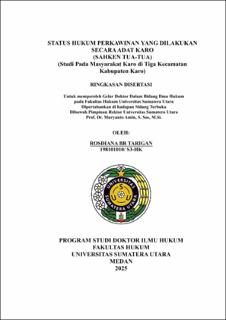Status Hukum Perkawinan Yang Dilakukan Secara Adat Karo (Sahken Tua-Tua) (Studi Pada Masyarakat Karo Di Tiga Kecamatan Kabupaten Karo)
The Legal Status Of Marriages Performed In The Karo Tradition (Sahken Tua-Tua) (Studying Of Three Districts In Karo Regency)

Date
2025Author
Tarigan, Rosdiana Br
Advisor(s)
Runtung
Ginting, Budiman
Sembiring, Rosnidar
Metadata
Show full item recordAbstract
In Karo traditional communities in several sub-districts in Karo district, it turns out
that there are still those who carry out marriages only according to Karo traditional law
(Sahken Tua-Tua) without registering the marriage. This is motivated by the Karo
community's assumption that if a customary marriage has been carried out, the marriage is
considered valid because Tukur (wedding gold) has been handed over and has been delivered
to the person entitled to receive it. In addition, some Karo people still consider traditional
marriage to be more powerful and stronger than other laws governing marriage. The number
of marriages conducted in the research area in the last 5 (five) years (2017-2022) is around
115 (one hundred and fifteen) couples, both legal and traditional marriages. Of the total
number of marriages, around 27 couples (14.2%) still perform marriages only according to
Karo tradition, which is legalized by the traditional marriage law holder (Sahken Tua-Tua).
The type of research used in this writing is empirical juridical or sociological legal
research, namely by looking at the reality of a law in society, which will find out the form of
legal arrangements regarding the Legal Status of Marriages Performed in Karo Tradition
(Sahken Tua Tua) Study of the Karo Community in Three Districts of Karo Regency, namely:
Juhar District, Tiga Binanga District and Lau Baleng District. The nature of this research is
prescriptive, namely research that aims to obtain suggestions regarding what should be done
to overcome certain problems. The types of data in this analysis include primary data and
secondary data. Primary data in this research is by conducting interviews with several sources
including: Traditional Leaders, Village Heads, Population and Civil Registration Office of
Karo Regency, Kabanjahe District Court, perpetrators of Karo traditional marriage (Sahken
Tua-Tua). secondary data in the form of primary legal materials, secondary legal materials
and tertiary legal materials.
Problems which occur in Karo Customary Marriages (Sahken Tua-Tua) include
constraints on the rights of the community in terms of the issuance of KTP (Identity Card),
KK (Family Card), Birth Certificates and other documents related to population from the
Population and Civil Registration Office of Karo Regency. Factors causing some Karo people
in Karo District not to perform legal marriages include: religious differences, education,
pregnancy outside of marriage and economic factors.
Karo marriages (Sahken Tua-Tua) should be legalized by law because the
Constitution of the Republic of Indonesia (UUD 1945) Article 18B provides that the state
respects and recognizes traditional law and the rights of indigenous peoples. It is appropriate
for the Karo indigenous people to get their rights as citizens.
Collections
- Doctoral Dissertations [173]
